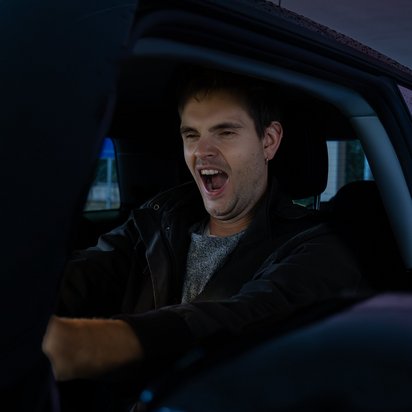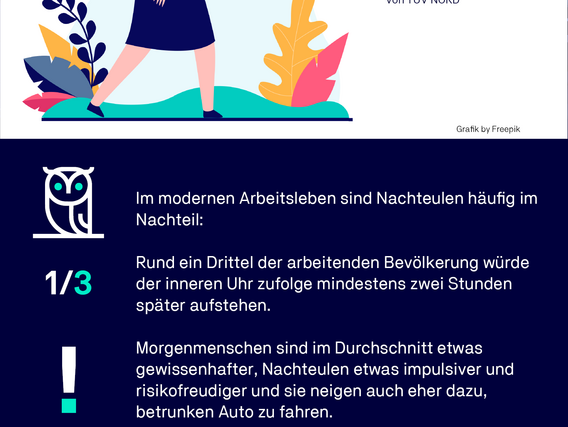Wenn das Leben nicht zum Chronotyp passt


Many night owls have to get up early in the morning, even though their internal clock is still set to sleep. This reduces their mental fitness - even at the wheel.
Each of us has an internal clock ticking. It ensures that we are tired in the evening and awake again in the morning. But this doesn't happen at the same time for everyone. Typical morning people wake up early, while night owls are still in a deep sleep. “In technical jargon, we talk about early and late chronotypes,” explains Philip Frieg from the Medical-Psychological Institute of TÜV NORD in Dortmund.
It was once advantageous for the survival of our ancestors if the members of a group slept at different times. But today, in modern working life, night owls are often at a disadvantage: they don't get tired until late in the evening and still have to get up early in the morning. So they don't get enough sleep. The number of people suffering from this kind of social jet lag is high. Experts have calculated that around a third of the working population would get up at least two hours later according to their internal clock.
In adolescents, wake-up times and internal clocks are even less compatible. During puberty, the sleep-wake rhythm shifts significantly backwards, and the trend only reverses again at around the age of 20. However, schools do not take biology into account: they usually start at 8 o'clock. “Most young people aren't really awake at that time,” says Frieg, who holds a doctorate in psychology.
This has an impact on school grades, among other things, as a study in the Netherlands showed. On a scale of 1 to 10, young people with a late chronotype scored on average around half a grade lower than those with an early chronotype in exams in the morning. Night owls with a social jet lag of more than three hours had the worst grades - which applied to a fifth of them. In contrast, there was no difference between early and late chronotypes in afternoon exams.

But just one extra hour in the morning could help. A survey of around 6,500 Russian pupils in grades 6 to 11 has proven this: they had better grades if lessons started at 9am instead of 8am. However, not all studies show such an effect. It is likely that one hour is often not enough - some experts therefore recommend starting school at 10 a.m. for young people.
Differences between early and late chronotypes
Experiments with adults also show that late chronotypes are less physically and mentally fit in the morning than early chronotypes. In the evening it is sometimes the other way around. For example, when it comes to spatial perception: late chronotypes are slower in the morning, but faster than early chronotypes in the evening. In experiments in the driving simulator, however, the chronotypes differ particularly clearly in the morning, to the disadvantage of the night owls: they make more mistakes and drive more unsafely than morning people.
Researchers suspect that these differences could also be linked to other characteristics. For example, morning people are on average somewhat more conscientious, night owls somewhat more impulsive and more willing to take risks, and they are also more likely to drive drunk.
Lifestyle is even reflected in life expectancy. In long-term studies, around ten percent more night owls die over a period of several years or decades. According to a Finnish analysis, this is mainly due to increased nicotine and alcohol consumption. Those night owls who neither drank nor smoked a lot did not have an increased risk of death.
Which chronotype am I?
Whether an owl or not: “Living healthily means getting enough sleep,” says Philip Frieg from TÜV NORD. But it's not so easy to fall asleep on time when you're not yet tired. But the internal clock can be adjusted a little. Firstly, by avoiding anything that activates the body, especially bright light, two to three hours before the desired bedtime. Secondly, by filling up on daylight immediately after getting up: by taking a walk outside or using a daylight lamp. “The light suppresses the sleep hormone melatonin,” explains the psychologist.
Daylight in the morning, twilight in the evening: this can help. However, this is not enough for social jet lag lasting several hours. In such cases, experts advise adapting everyday life to the biological clock - if necessary by changing jobs. If this is not possible, there is still hope in biology: in adults, the chronotype usually shifts towards the morning with increasing age, reports Philip Frieg. “Some owls become early birds after all.”
Founded over 150 years ago, we stand for security and trust worldwide. As a knowledge company, we have our sights firmly set on the digital future. Whether engineers, IT security experts or specialists for the mobility of the future: in more than 100 countries, we ensure that our customers become even more successful in the networked world.